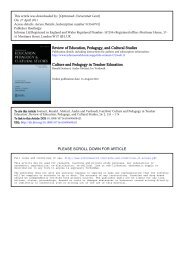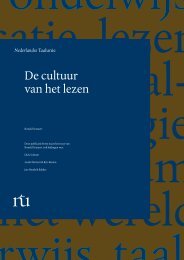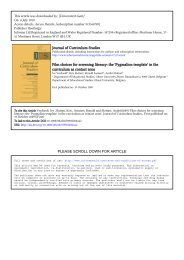a view informed by the problems of traditional literacy in a digital age
a view informed by the problems of traditional literacy in a digital age
a view informed by the problems of traditional literacy in a digital age
Create successful ePaper yourself
Turn your PDF publications into a flip-book with our unique Google optimized e-Paper software.
Downloaded <strong>by</strong> [University <strong>of</strong> Gent] at 06:46 09 December 2011<br />
Ronald Soetaert & Bart Bonamie<br />
web <strong>of</strong> relations to be rewoven, a web which time leng<strong>the</strong>ns every day’<br />
(Rorty, 1989, pp. 42–43).<br />
Media Literacy<br />
We are all confronted with <strong>the</strong> ubiquity <strong>of</strong> media <strong>in</strong> our society. Mass media<br />
create a w<strong>in</strong>dow on <strong>the</strong> world; more and more we have to recognise that<br />
media also construct our im<strong>age</strong> <strong>of</strong> this world. Education must meet <strong>the</strong><br />
challenge <strong>of</strong> <strong>in</strong>troduc<strong>in</strong>g students to a new k<strong>in</strong>d <strong>of</strong> media <strong>literacy</strong>. This is<br />
one <strong>of</strong> <strong>the</strong> most serious challenges as we enter <strong>the</strong> twenty-first century. This<br />
‘new k<strong>in</strong>d’ <strong>of</strong> <strong>literacy</strong> should <strong>in</strong>clude visual and audio <strong>literacy</strong>. Inevitably,<br />
this implies a different k<strong>in</strong>d <strong>of</strong> pr<strong>in</strong>t or textual <strong>literacy</strong>. To broaden <strong>the</strong><br />
concept <strong>of</strong> <strong>literacy</strong> implies – for some – a dilution <strong>of</strong> our skills <strong>in</strong> textual<br />
<strong>literacy</strong>.<br />
The plea for tak<strong>in</strong>g mass media seriously is about more than radio,<br />
television, film … <strong>the</strong> Internet (primarily via <strong>the</strong> World Wide Web) has<br />
changed <strong>the</strong> landscape <strong>of</strong> mass media. There is a major difference: <strong>the</strong><br />
political pressure to take <strong>the</strong> technological revolution seriously <strong>in</strong> education<br />
is greater than ever, s<strong>in</strong>ce it is prompted <strong>by</strong> <strong>the</strong> importance <strong>of</strong> this<br />
revolution for <strong>the</strong> economy.<br />
More and more communication and <strong>in</strong>formation is presented <strong>in</strong> a<br />
<strong>digital</strong> environment so we should be aware <strong>of</strong> <strong>the</strong> fact that citizens who<br />
cannot participate <strong>in</strong> cyberspace will be functionally illiterate. We are<br />
becom<strong>in</strong>g aware that those who tend to lag beh<strong>in</strong>d <strong>in</strong> technology will be <strong>the</strong><br />
have-nots <strong>of</strong> <strong>the</strong> future. Not hav<strong>in</strong>g access to <strong>the</strong> Internet will create a gap.<br />
The network reorganises our power relationships (Castells, 1996;<br />
Castells et al, 1999). We have to make vision statements <strong>in</strong> which we<br />
envision a future culture and pedagogy. Apart from <strong>the</strong>oris<strong>in</strong>g, we also have<br />
to create ‘practice’. Teach<strong>in</strong>g new skills will be a prerequisite.<br />
From <strong>the</strong> perspective <strong>of</strong> ‘knowledge’, we should stress <strong>the</strong> importance<br />
<strong>of</strong> understand<strong>in</strong>g:<br />
o <strong>the</strong> role <strong>of</strong> <strong>in</strong>formation and communications technology (ICT) for society<br />
(production, control, reception <strong>of</strong> <strong>in</strong>formation);<br />
o <strong>the</strong> role <strong>of</strong> ICT for policy mak<strong>in</strong>g and enterta<strong>in</strong>ment (<strong>the</strong> creation <strong>of</strong> a<br />
public sphere);<br />
o <strong>the</strong> role <strong>of</strong> ICT for different <strong>in</strong>stitutions (school, library, mass media ...)<br />
and discipl<strong>in</strong>es (science, art, humanities ...);<br />
o <strong>the</strong> role <strong>of</strong> ICT for <strong>in</strong>dividuals (personal, pr<strong>of</strong>essional).<br />
And all this implies a deep understand<strong>in</strong>g <strong>of</strong> how <strong>in</strong>dividuals and <strong>in</strong>stitutions<br />
manipulate <strong>in</strong>formation, how new discourses and rhetoric emerge, how tools<br />
create <strong>in</strong>formation and <strong>of</strong> course we need to evaluate all <strong>the</strong>se<br />
transformations.<br />
Look<strong>in</strong>g at <strong>literacy</strong> more broadly implies tak<strong>in</strong>g <strong>in</strong>to account <strong>the</strong><br />
‘knowledge work’ we have to perform. This k<strong>in</strong>d <strong>of</strong> work implies a more<br />
128





